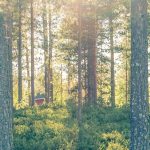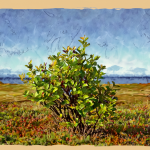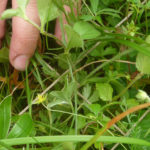By Joseph Gaudard The European Geosciences Union Annual Meeting is a major conference in natural science, and a good place to present “almost finished work”. It is also a terrifying event, with about 20’000 participants on site. In 2024, I was a first time attendee going there alone. It was a lonely week of failed networking and quiet lunch breaks. I took notes of my mistakes and when I applied for funding to go again in 2025, I promised a deliverable in the shape of a toolbox for early career researcher going to a big conference for the first time. So, here it is. I have made it as a github repo with a GPL-3.0 licence, with the idea that people can fork it and adapt it for themselves. It contains a tutorial to make a CV as a github page, with a QR code linking to it, a tool I find convenient when networking. It also contains my “conference DOs” and a conference bingo of action points to aim for.So did I do better this time? Yes. I had planned who I wanted to meet, which snowballed in meeting more people, and I turned my week into a networking marathon. The only “conference DON’Ts” I had written down in 2024 and redid in 2025 was “writing a grant application during the conference”, but hey, deadlines… https://github.com/jogaudard/ecr_toolbox

Come work with us! ECOBUDGETS looks at how a budgeting approach to land management can lead to political decisions that take into account national and local goals for nature and climate. Several municipalities are developing methods and tools for using map-based approaches in land management, for example through nature accounts and climate budgeting. Bergen Municipality and Vestland County Council, partners in the project, are well advanced in this field. In the project, we will collaborate with them to understand how land, climate and nature budgeting can work in practice, and how these tools can be coordinated and developed into better tools for decision-making. Read more and apply here. Deadline: 31 January 2025.

Are you interested in plant functional types and ecosystem modelling? Come work with us! Dwarf-shrubs are a dominant plant functional group across the boreal, arctic and alpine biomes, and they play important roles for biodiversity, ecology and ecosystem functioning in the habitats in which they occur. For example, dwarf-shrubs provide important food resources for grazers, pollinators, and people and habitat for other plants, insects, rodents, and birds. Through interactions with fungal symbionts in the soil (ericoid mychorriza), they play critical roles in ecosystem carbon sequestration and carbon storage, with implications for feedbacks from terrestrial ecosystems to the global climate system. DURIN will explore the role of dwarf-shrubs in climate responses and feedbacks across biomes and habitats in Norway, integrating plant physiology, ecology, and ecosystem science. Using distributed observational systems, field experiments, and growth chamber studies, we will obtain fundamental knowledge on how climate change directly and indirectly affects this important plant functional group, and its ecosystem functions and services. This improved process understanding will be integrated in land surface and earth system models to understand the role and contribution of dwarf-shrubs in the feedbacks from terrestrial vegetation to the climate system. DURIN explores the role of dwarf-shrubs in climate responses and feedbacks across biomes and habitats in Norway, integrating plant physiology, ecology, and ecosystem science. Using distributed observational systems, field experiments, and growth chamber studies, we will obtain fundamental knowledge on how climate change directly and indirectly affects this important plant functional group, and its ecosystem functions and services. This improved process understanding will be integrated in land surface and earth system models to understand the role and contribution of dwarf-shrubs in the feedbacks from terrestrial vegetation to the climate system. The Postdoctoral Research Fellow will be working within WP4 (Climate feedbacks: The CLM-FATES platform), focussing on improving the representation of dwarf-shrubs as a plant functional type in terrestrial ecosystem model CLM-FATES. The candidate will, for example: Improve the parameterization of dwarf-shrub plant functional type (PFT) in CLM-FATES and calibrate the model at DURIN observation sites. Conduct model experiments at regional and global scales to explore the response of dwarf-shrubs to climate changes. Run model simulations with dwarf-shrub PFT to assess the role of dwarf-shrubs in both biochemical and biophysical climate feedbacks. Lead and contribute to publications arising from the work. Collaborate with other ecologists and climate scientists over synthesis and upscaling. Use open and transparent workflows to manage, analyse, and openly share data. Further develop CLM-FATES platform (https://github.com/NorESMhub/noresm-land-sites-platform) for site simulations and model-data integration. This is a collaborative project between the University of Bergen and collaborators from CICERO and Finnish Meteorological Institute (FMI). The postdoctoral research fellow will be working closely with both institutions, including opportunities for extended works stays in these institutes for setting up modelling and analytical work. For more details and to apply, visit the official announcement on jobbnorge.no Durin fieldwork on Senja, July 2023

Are you interested in plant functional types and ecosystem modelling? Come work with us! Dwarf-shrubs are a dominant plant functional group across the boreal, arctic and alpine biomes, and they play important roles for biodiversity, ecology and ecosystem functioning in the habitats in which they occur. For example, dwarf-shrubs provide important food resources for grazers, pollinators, and people and habitat for other plants, insects, rodents, and birds. Through interactions with fungal symbionts in the soil (ericoid mychorriza), they play critical roles in ecosystem carbon sequestration and carbon storage, with implications for feedbacks from terrestrial ecosystems to the global climate system. DURIN will explore the role of dwarf-shrubs in climate responses and feedbacks across biomes and habitats in Norway, integrating plant physiology, ecology, and ecosystem science. Using distributed observational systems, field experiments, and growth chamber studies, we will obtain fundamental knowledge on how climate change directly and indirectly affects this important plant functional group, and its ecosystem functions and services. This improved process understanding will be integrated in land surface and earth system models to understand the role and contribution of dwarf-shrubs in the feedbacks from terrestrial vegetation to the climate system. DURIN explores the role of dwarf-shrubs in climate responses and feedbacks across biomes and habitats in Norway, integrating plant physiology, ecology, and ecosystem science. Using distributed observational systems, field experiments, and growth chamber studies, we will obtain fundamental knowledge on how climate change directly and indirectly affects this important plant functional group, and its ecosystem functions and services. This improved process understanding will be integrated in land surface and earth system models to understand the role and contribution of dwarf-shrubs in the feedbacks from terrestrial vegetation to the climate system. The Postdoctoral Research Fellow will be working within WP4 (Climate feedbacks: The CLM-FATES platform), focussing on improving the representation of dwarf-shrubs as a plant functional type in terrestrial ecosystem model CLM-FATES. The candidate will, for example: Improve the parameterization of dwarf-shrub plant functional type (PFT) in CLM-FATES and calibrate the model at DURIN observation sites. Conduct model experiments at regional and global scales to explore the response of dwarf-shrubs to climate changes. Run model simulations with dwarf-shrub PFT to assess the role of dwarf-shrubs in both biochemical and biophysical climate feedbacks. Lead and contribute to publications arising from the work. Collaborate with other ecologists and climate scientists over synthesis and upscaling. Use open and transparent workflows to manage, analyse, and openly share data. Further develop CLM-FATES platform (https://github.com/NorESMhub/noresm-land-sites-platform) for site simulations and model-data integration. This is a collaborative project between the University of Bergen and collaborators from CICERO and Finnish Meteorological Institute (FMI). The postdoctoral research fellow will be working closely with both institutions, including opportunities for extended works stays in these institutes for setting up modelling and analytical work. For more details and to apply, visit the official announcement on jobbnorge.no Durin fieldwork on Senja, July 2023
Are you interested in plant-soil interactions and mycorrhizal associations in nordic environments? Come work with us! Dwarf-shrubs are a dominant plant functional group across the boreal, arctic and alpine biomes, and they play important roles for biodiversity, ecology and ecosystem functioning in the habitats in which they occur. For example, dwarf-shrubs provide important food resources for grazers, pollinators, and people and habitat for other plants, insects, rodents, and birds. Through interactions with belowground fungal networks (ericoid mycorrhiza), they play critical roles in carbon sequestration and long-term carbon storage in soils, suggesting that dwarf-shrubs may play a critical role in feedbacks from land to the climate system. DURIN will explore the role of dwarf-shrubs in climate responses and feedbacks across biomes and habitats in Norway, integrating plant physiology, ecology, and ecosystem science. Using distributed observational systems, field experiments, and growth chamber studies, we will obtain fundamental knowledge on how climate change directly and indirectly affects this important plant functional group, and its ecosystem functions and services. This improved process understanding will be integrated in land surface and earth system models to understand the role and contribution of dwarf-shrubs in the feedbacks from terrestrial vegetation to the climate system. The PhD candidate will be working within WP2 (Species interactions), focussing on plant-mycorrhizal interactions. The candidate will, for example: Take part in the selection of field sites and implementation of the experimental setup. Analyse the diversity and distribution of dwarf-shrub fungal associations from plant and soils samples using high throughput DNA sequencing (DNA metabarcoding). Investigate ErM contributions to carbon dynamics using e.g. exclusion experiments and litter/necromass bags, to assess decomposition processes and ingrowth bags to assess mycelial production via ergosterol measurements. Conduct resynthesis experiments in controlled climates to assess the effect of ErM on dwarf-shrub performance and climate response. In collaboration with other project participants, assess climate control of dwarf-shrub interactions beyond the fungusphere (e.g., pollination, berry production, plant-plant interactions) and participate in globally distributed experiments, especially those focussing on interactions. Develop their own research questions and hypotheses related to these experiments and measurements. Collaborate with other ecologists and climate scientists over synthesis and upscaling. Use open and transparent workflows to manage, analyse, and openly share data. Both lead and contribute to writing and publishing collaborative research papers. This is a collaborative project between the University of Bergen and the University of Oslo, where the fungal work will be led and conducted at the University of Oslo. The PhD Research Fellow will be working closely with both institutions, including extended works stays in Oslo for lab and analytical work. For more details and to apply, visit the official announcement on jobbnorge.no Durin fieldwork on Senja, July 2023
Do you have a Master’s degree in Plant Ecology or similar, and are you interested in alpine ecology, climate change, alien species, and functional ecology? We are hiring a PhD student for 3 year to work with us in the RangeX project. Project description: Native as well as exotic species are shifting their distributions in response to global warming and through biological invasions, many expanding their ranges across elevation gradients. But species are doing so at widely different rates, leading to a reassembly of ecological communities that could have even more profound impacts on the future of biodiversity, ecosystem functioning, and nature’s benefits to people. In particular, changes to species interactions in novel communities could mediate effects of climate warming on biodiversity, and on key ecosystem functions like carbon cycling and pollination, which could in turn feedback to climate warming. RangeX seeks to better understand the processes and impacts of plants that are expanding their ranges following climate warming, and to use this knowledge to inform the development of policy regarding range-expanding plant species. The project asks the following overarching questions: 1. What processes explain variation in species’ range expansion with climate warming? 2. How do range-expanding species impact alpine biodiversity and key ecosystem functions, and how will these impacts feed back to changing climate? 3. Can we predict which species are most/least able to expand their ranges with climate warming, and their impact on ecosystem processes? 4. Can better ecological understanding of range expansions be synthesised with stakeholder knowledge to improve policy and management of range expansions and biodiversity? The PhD research fellow will work especially on tasks 1 through 3. Specifically, the fellow will: Have responsibility for maintaining the Norwegian site of a replicated climate and range expansion experiment and collect plant and ecosystem-level data from this site. Lead the writing of 2-3 research papers leading to a PhD thesis focussed on this experiment. Collaborate with the international team to collect additional data from the Norwegian site, and to analyse and writing publications and synthesis across the network of sites. Have the opportunity to interact with partners across the international consortium and to engage with relevant stakeholders to codevelop synthesis and policy-relevant information about plant range expansions. Visit the job advertisement here for more details and to apply.
New project Durin studies the role of dwarf shrubs in our ecosystems; from species interactions to ecosystems responses and feedbacks across scales. Dwarf-shrubs (Ericaceae) are a dominant plant functional group across the boreal, arctic, and alpine biomes, where they play important roles for biodiversity, ecology and ecosystem functioning. DURIN will explore the role of dwarf-shrubs in climate responses and feedbacks across biomes and habitats, integrating plant physiology, ecology, ecosystem, and climate science. Using distributed observational systems, field experiments, and growth chamber studies; we will obtain fundamental knowledge on how climate change directly and indirectly affects this important plant functional group, and it’s ecosystem functions and services. This improved process understanding will be integrated in land surface and earth system models to understand the role and contribution of dwarf-shrubs in the feedbacks from terrestrial vegetation to the climate system. Sounds interesting? We are hiring PhD and a Postdoc to work with us! The PhD Research Fellow will be working within WP3 (Ecosystem functioning). This WP uses field and controlled-environment experiments to study the impact of climate, and open vs. forested habitats in different environments (alpine, arctic coastal), along with the role of variation in plant functional traits and ericoid mycorrhiza association, on ecosystem functioning, focusing on carbon (C stocks and dynamics, growth, and decomposition). Apply here for the PhD position The Postdoctoral Research Fellow will be working within WP2 (Species interactions), focussing on plant-mycorrhizal interactions. The position includes analysis of diversity and distribution dwarf shrub-fungal associations using DNA metabarcoding techniques, and investigation of ErM contributions to carbon dynamics by assessing decomposition processes using ingrowth bags and mycelial production via ergosterol measurements. Apply here for the Postdoc position
Come work with us! We are looking for a head engineer (Overingeniør) who will work on a variety of our project-based research activities. Ongoing projects related to this position are all based at the Ecological and Environmental Change Research Group at the University of Bergen. Currently projects include TradMod, QUEST-UV, Cultivate, RangeX, Durin, BIOSPHERE and Incline. As head engineer, you will be involved in ecological field and lab work, data management, science communication, and project management. The position is now announced on JobbNorge, deadline 2. March 2022.

We seek a postdoc in the FUNDER project, which will assess and disentangle the direct effects of climate from the indirect effects, mediated through biotic interactions, on the diversity and whole-ecosystem functioning of the plant−soil food web. To achieve this, we use a powerful macroecological experimental approach to quantify the impacts of vegetation diversity on interactions and ecosystem functioning across factorial broad-scale temperature and precipitation gradients. The successful candidate will focus on the role of soil microorganisms (mainly bacteria and fungi) in ecosystem responses and feedbacks to climate. The work will be based around data from climate and plant functional group manipulations in a distributed field experiment, conducted with other project participants. To apply, visit the jobbnorge website. Application deadline is 22nd of January 2022.
